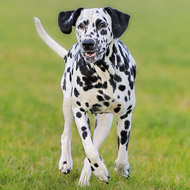Novel gene explains fatal ARDS in Dalmatians

Breeders have learned to avoid the risk lines but it is challenging to eradicate recessive disorders such as ARDS without genetic testing, as the carriers are not affected by the disease.
Scientists have discovered a novel gene associated with acute respiratory distress syndrome (ARDS) in Dalmatians. The research could help to diagnose and eradicate the disease in dogs, as well as improving understanding of respiratory disease in humans.
ARDS has an early onset, with puppies and young dogs experiencing difficulty breathing, leading to rapid death. It has been known to affect the breed for some time, although the frequency of carriers is said to be low. Breeders have learned to avoid the risk lines but it is challenging to eradicate recessive disorders such as ARDS without genetic testing, as the carriers are not affected by the disease.
Professor Hannes Lohi from the University of Helsinki explained to Science Daily: “There are many causes for lethal acute respiratory distress. In humans, the underlying cause is often pneumonia, inflammation or pulmonary fibrosis.
“In Dalmatians, the cause is a genetic lung tissue disorder. Our study indicates that the disorder results from a defect in an anilin protein which binds to actin, the supporting microfilaments in the cell.”
Anilin is important for cell division and growth. According to Dr Marjo Hytönen, the lung injury in affected dogs appears to be linked to an abnormal regeneration capacity of the bronchiolar epithelium. “The ANLN gene discovery is in line with this manifestation of the disease,” Dr Hytönen explained.
Researchers examined material previously collected at the university’s Veterinary Teaching Hospital, as well as canine biobank samples. They tested 180 Dalmatians and 30 pointers for the mutation association with ARDS, finding less than two per cent of the Dalmatians had it, while none of the pointers did.
Some of the affected dogs only had one kidney, while others had hydrocephalus, which suggests ANLN has “broader significance for the development of the epithelium in different organs,” Dr Hytönen added.
Veterinary pathologist Pernilla Syrjä said: “This gene discovery provides new insights into the mechanisms of lung injuries. Typically, lung injuries in the affected Dalmatians are associated with disorders in the cellular regeneration and intercellular junctions.
“The lack of anillin, the actin-binding protein, can perfectly explain the changes which we see on the cellular level. Due to the malformed epithelial structure, inhaled air is trapped in the alveolar level, over-extending the alveolar walls.”
The genetic test will be made available via the MyDogDNA test, www.mydogdna.com
The findings have been published in the journal PLOS Genetics



 Zoetis has launched a new survey to identify management techniques for Equine Herpes Virus (EHV).
Zoetis has launched a new survey to identify management techniques for Equine Herpes Virus (EHV).